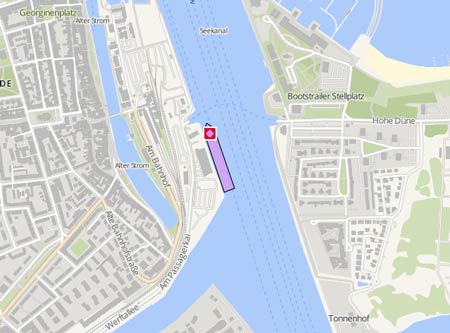AWANUIA
Kurs/Position
vor 3 Min
Die letzten Häfen
Die letzten Wegpunkte
Die neuesten Nachrichten
Allision in Auckland
The "Awanuia" allided with the quay of Wynyard wharf in the port of Auckland during a berthing manoever on July 13, 2017. The ship lost power on approach to the wharf and effectively T-boned the wharf, suffering significant damage to the bow which was holed above the waterline. The concrete of the wharf suffered minor damage when the ship hit with slow speed. No spill reported. The tanker safely berthed at the the Bledisloe Container Terminal. Port of Auckland launched an investigation into the incident. Reports with photos: https://www.stuff.co.nz/auckland/94716793/fuel-ship-crashes-into-aucklands-wynyard-wharf-while-berthing http://www.nzherald.co.nz/nz/news/article.cfm?c_id=1&objectid=11890113
Ports of Auckland Welcomes New 10-Year Bunker Vessel Charter Agreement
Ports of Auckland Limited (Ports of Auckland) announced that Seafuels, their equally shared venture with PB Bunkers BVI Ltd, has signed a 10-year charter agreement with Z Energy for the fuel bunkering vessel Awanuia, PortNews reports.
Legal action of Svitzer against charter during Rena salvage may continue
Svitzer Salvage BV has been told by the High Court in Wellington that its challenge against the fees it paid to charter the "Awanuia" to take oil off the grounded container vessel "Rena" could continue. Svitzer was called in after the "Rena" hit the Astrolabe Reef on October 5, 2011 off the Port of Tauranga, threatening the Bay of Plenty with a catastrophic oil spill. But with bad weather approaching and the Rena unlikely to be refloated, Svitzer found itself trapped into chartering the "Awanuia", being the only tanker in New Zealand capable of draining off the "Rena"'s 1900 tonnes of fuel oil, and for that it claimed it was forced to pay an exorbitant price. Now the salvors were seeking to have the contract for the charter of the tanker set aside, claiming it was pressured into submitting to outrageous costs which totalled nearly $9 million for the 43-day hire. In a written ruling just released, Justice Lowell Goddard ruled for the salvage company in three of six applications, allowing the case to proceed. He also released Z Energy as a defendant. Svitzer claimed it was under intense pressure from Maritime New Zealand while negotiating the charter of "Awanuia", which was owned by local company Seafuels Limited, and was under long-term charter to Z Energy. Z Energy moved quickly to release the ship at substantial inconvenience and potential financial cost out of a sense of responsibility to the environment, and told the High Court it remained proud of its action which allowed Svitzer to conclude a short-term charter with Seafuels. Z Energy's conditions to Seafuels were that it would not be left out of pocket, and that Seafuels would meet the costs and expected losses it would suffer from releasing "Awanuia" from the charter until the salvage was over. The deal would also see the oil recovered transferred to Z Energy. Z Energy's release agreement required payment of $150,000 plus GST per week for a minimum of one week, and a pro-rata daily rate based on that figure after that, as well as reimbursing its costs, which would be capped at $100,000 a week. But Svitzer paid far more for its charter with Seafuels, a deal which Z Energy was not party to, and did not know the terms of at the time, Justice Goddard found. Svitzer ended up paying Seafuels between $187,000 and $200,000 a day for the 43-day charter period, a period vastly longer than the three to four days that had been expected because bad weather hampered the operation. The charter deal was completed on Oct 9 2011 under protest from Svitzer, which claimed it had no option other than to accept its terms. It complained at the time that it did not own the oil so completing the contract with Seafuels would require it to commit an illegal act, although that position changed, Z Energy said, because it had negotiated a separate deal with Svitzer to buy the oil. Seafuels' final bill to Svitzer totalled $8.88 m, the court heard, of which just under $3 m remains unpaid. Svitzer started legal action to have the charter party, as the contract is known, set aside, or modified under article seven of the International Convention on Salvage 1989, which gives the courts powers to annul or modify inequitable salvage contracts. The latest ruling allowed its action to continue, with Judge Goddard dismissing three of the four strike out causes put forward by Seafuels, though ruling that Seafuels could not be fairly accused of exerting duress on Svitzer. But while Svitzer could continue its claim against Seafuels, Justice Goddard released Z Energy as a defendant, saying there was no valid reason why it should remain a party to the proceeding. Z Energy was not a party to the contract between Seafuels and Svitzer, the judge said, nor did it know the rate Svitzer was being charged by Seafuels
News schreiben

